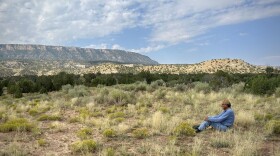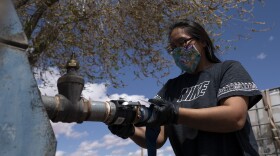-
A lifestyle and enduring relationship with horses lends to the popularity of rodeo in Indian CountryBorn out of necessity and in mastering skills that came as horses transformed hunting, travel and warfare, rodeo has remained popular in Native American communities. Grandstands often play host to mini family reunions while Native cowboys and cowgirls show off their skills roping, riding and wrestling livestock. It's a lifestyle that's connected to nature and community — values that Oglala Lakota citizen Jessica White Plume says run deep in tribal culture. With each competition, Native Americans make it decidedly theirs. Ornate regalia, blessings bestowed by tribal elders and tribes' versions of flag songs are as much staples as big buckles and cowboy hats.
-
Leaders from the Indigenous Resilience Center shared at the One Water Summit about their efforts to work with tribal communities on water audits, filtration systems, and other solutions.
-
There’s been an increase in hydropower projects across the U.S., including on different tribal reservations. But some advocates say tribes like the Navajo Nation aren’t being consulted enough about their development.
-
The Interior Department is spending around $40 million in tribal communities to plug old oil and gas wells that have caused serious pollution.
-
The Supreme Court has ruled against the Navajo Nation in a case centered on the tribe’s rights to the drying Colorado River. The tribe claimed it was the federal government’s legal duty to help figure out their future water needs, and aid them in using their rights. But in a 5-4 decision, the justices said an 1868 treaty included no such promises.
-
As residents of a small community on the Navajo Nation eagerly await construction of a 7-mile water pipeline from the Rio Grande, they imagine the luxuries of running water.
-
In the Southwest, tribal health organizations are finding ways to counter the factors – including the lack of access to clean drinking water – that contribute to high rates of childhood obesity in Native communities.
-
The Diné Household Water Survey, a first-of-its-kind two-year project led by the Johns Hopkins Center for Indigenous Health, aims to accurately quantify the number of households without access to safe drinking water.
-
-
One of the last remaining Navajo Code Talkers has died. Samuel Sandoval's wife, Malula, says he died late Friday at a hospital in Shiprock, New Mexico. He was 98.

Play Live Radio
Next Up:
0:00
0:00
Available On Air Stations










